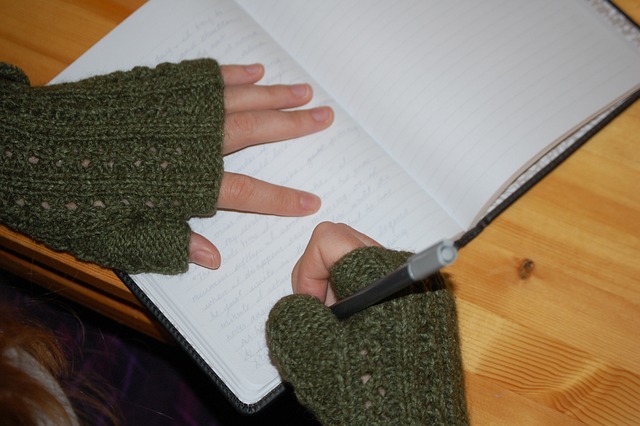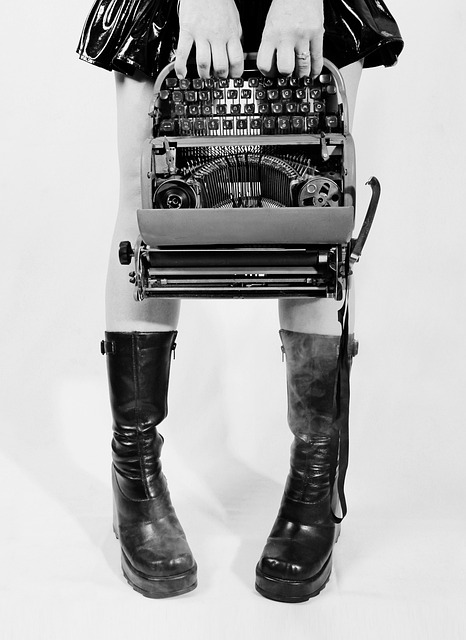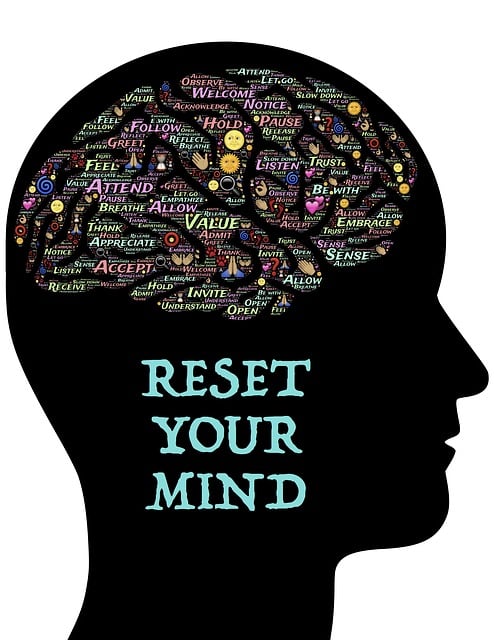Have you ever found yourself staring blankly at a blank page, your mind as empty as the untouched paper before you? If so, you have experienced the dreaded phenomenon known as writer’s block. It’s that creative roadblock that can leave even the most talented writers feeling frustrated and inadequate. But fear not, for in this article, we will delve into the depths of this enigmatic condition and explore why writer’s block happens. By understanding the intricacies of this creative hurdle, you’ll be equipped with the tools needed to overcome it and reignite your imagination. So, grab your pen and paper as we unravel the mysteries behind writer’s block!
Contents
- What is Writer’s Block and Why Does It Happen?
- Understanding the Psychological Factors Behind Writer’s Block
- Exploring External Factors that Contribute to Writer’s Block
- Practical Strategies to Overcome Writer’s Block
- Effective Ways to Cultivate a Productive Writing Routine and Prevent Writer’s Block
- The Role of Self-Compassion and Mindfulness in Overcoming Writer’s Block
- The Power of Self-Compassion
- Mindfulness: Navigating the Block
- Seeking Support: How Collaborative Writing and Feedback Can Help Beat Writer’s Block
- Frequently Asked Questions
- In Summary
What is Writer’s Block and Why Does It Happen?
What is Writer’s Block?
Writer’s block is a common phenomenon experienced by writers, professional or amateur, where they find themselves unable to produce new work or feel a sudden creative blockage. It is like hitting a brick wall, hindering the flow of thoughts and ideas. Writers may struggle to come up with new concepts, feel unproductive, or find it challenging to express their thoughts fluently. The frustrating aspect of writer’s block is that it can strike anyone at any time, regardless of their level of experience or expertise. Whether you are a novelist, a poet, a journalist, or a content creator, writer’s block can be a formidable obstacle to overcome.
Why Does Writer’s Block Happen?
Writer’s block can be triggered by various factors, depending on the individual. Here are some common reasons why writer’s block occurs:
- Perfectionism: Striving for perfection can be counterproductive and lead to self-doubt. Writers may fear that their work will not meet their own high standards.
- Lack of inspiration: Sometimes, a writer may struggle to find inspiration or have difficulty generating new ideas. This lack of fresh perspectives can impede the creative process.
- Stress or pressure: External factors, such as deadlines or personal stress, can inhibit creativity and make it challenging to focus on writing.
- Overwhelm: Having too many ideas or projects at once can create confusion, making it difficult to start or finish a specific piece.
Writer’s block is a common and often frustrating occurrence for writers. It can be caused by various factors, such as perfectionism, lack of inspiration, stress, or overwhelm. Overcoming writer’s block requires patience and creative strategies, which we will explore in the next section.
Understanding the Psychological Factors Behind Writer’s Block
Writer’s block, the frustrating phenomenon that plagues many writers, is often shrouded in mystery. However, by delving into the psychological factors that contribute to this creative obstacle, we can gain a deeper understanding of its causes and strategies to overcome it. Here are some key insights:
- Self-doubt: One of the primary psychological factors behind writer’s block is self-doubt. The fear of not being good enough or producing subpar work can paralyze a writer’s mind, hindering their ability to put words on paper. This self-imposed pressure can be overwhelming.
- Perfectionism: Striving for perfection can be a double-edged sword for writers. While it fuels the desire for excellence, it can also be a major contributor to writer’s block. The constant pursuit of flawlessness can result in an endless cycle of revisions and self-criticism, leaving writers stuck and unable to move forward.
- Overwhelm: The sheer magnitude of a writing project can easily overwhelm writers, triggering writer’s block. Whether it’s a looming deadline or a complex topic, the pressure to deliver can lead to mental fatigue and a sense of being mentally paralyzed.
Understanding these psychological factors allows us to develop effective strategies to combat writer’s block. By acknowledging self-doubt and countering it with self-compassion and positive self-talk, writers can regain confidence in their abilities. Embracing imperfection and allowing room for mistakes can alleviate the burdensome weight of perfectionism. Breaking down big writing tasks into smaller, achievable goals and managing time effectively can help writers conquer overwhelm. By addressing these underlying psychological factors head-on, writers can unlock their creativity and overcome the notorious writer’s block.
Exploring External Factors that Contribute to Writer’s Block
Writer’s block is a frustrating phenomenon that all writers encounter at some point in their creative journey. While the causes of writer’s block can be complex and multifaceted, it is important to explore the external factors that can contribute to this creative obstacle. Understanding these external factors can help overcome writer’s block and reignite the creative sparks.
One external factor that can contribute to writer’s block is environmental distractions. When the writing environment is noisy, cluttered, or uncomfortable, it becomes challenging to focus and channel creative energy. Creating a serene and organized writing space can help minimize distractions and promote a more conducive writing atmosphere. Additionally, surrounding oneself with inspiring elements, such as plants, artwork, or quotes from favorite authors, can stimulate imagination and combat writer’s block.
- Unsolicited feedback and criticism:
Another external factor that often contributes to writer’s block is unsolicited feedback and criticism. While constructive feedback can be valuable for growth, unsolicited opinions can cause self-doubt and hinder creative flow. It is important to be selective about sharing work in progress with trusted individuals who understand and appreciate the creative process. Taking control of the feedback received and using it to improve and refine writing can help mitigate the negative effects of unsolicited criticism.
- Time constraints and deadlines:
Time constraints and deadlines can be significant external factors that contribute to writer’s block. The pressure to meet expectations and produce high-quality work within a specific timeframe can lead to anxiety and an inability to start or progress with writing projects. Prioritizing time management and breaking down larger tasks into smaller, more manageable chunks can help alleviate the overwhelming feeling of being creatively blocked due to time constraints. Setting realistic deadlines and allowing for breaks and rest is also crucial in maintaining a healthy creative flow and avoiding writer’s block.
Practical Strategies to Overcome Writer’s Block
Writer’s block can be a frustrating hurdle to overcome, but with the right strategies, it doesn’t have to stall your creativity for long. Here are some practical tips to help get those words flowing again:
- Change your environment: Sometimes a change of scenery can do wonders for breaking through writer’s block. Try working in a different room, heading to a local café, or even taking your writing outdoors. The fresh surroundings can provide a new perspective and stimulate your creativity.
- Keep a journal: Journaling is not only a great way to express your thoughts and emotions, but it can also serve as a tool to combat writer’s block. Dedicate a few minutes each day to free writing in your journal. By allowing yourself to write freely without judgment or expectations, you may uncover new ideas and inspiration that can be translated into your work.
- Break it down: Writing an entire article or chapter at once can be overwhelming, leading to writer’s block. Instead, break your writing into smaller, manageable tasks. Start with an outline or brainstorming session to organize your thoughts. Then, focus on writing one paragraph or section at a time. This approach will help you tackle the task in bite-sized portions and make progress with each step.
Remember, writer’s block is a common experience for many writers, and it doesn’t mean you lack creativity or talent. With patience and these practical strategies, you can overcome the roadblock and continue to unleash your ideas onto the page.
Effective Ways to Cultivate a Productive Writing Routine and Prevent Writer’s Block
When it comes to maintaining a consistent and productive writing routine, it’s important to find strategies that work best for you. Follow these effective tips to overcome writer’s block and enhance your writing productivity:
- Create a designated writing space: Dedicate a specific area in your home or workspace solely for writing. This will help your mind associate that space with productivity, allowing you to focus and enter a writing flow more easily.
- Establish a writing schedule: Set aside a regular time each day or week for writing. Consistency is key! By making writing a habit, your mind will become trained to be creative during those set periods, reducing the chances of encountering writer’s block.
- Break tasks into smaller steps: Large writing projects can feel overwhelming, leading to procrastination and ultimately, writer’s block. Divide your work into smaller, manageable tasks. Start by outlining your ideas, then tackle each section one by one. This approach will make the writing process less daunting and more achievable.
Furthermore, implementing good self-care practices can significantly enhance your writing routine:
- Take breaks and move: Sitting for long periods can drain your creativity and increase the likelihood of writer’s block. Incorporate short breaks into your writing sessions. Use this time for stretching, walking, or engaging in activities that refresh your mind.
- Find your inspiration: Surround yourself with things that inspire you. Whether it’s music, artwork, or nature, these stimuli can fuel your creativity and help prevent writer’s block. Experiment and discover what sparks your imagination best.
- Practice freewriting: Freewriting is a fantastic technique for overcoming writer’s block. Set a timer, pick a topic, and write without stopping or worrying about grammar. This exercise loosens up your mind and allows ideas to flow more freely, ultimately enhancing your writing productivity.
By incorporating these strategies into your routine while taking care of your mental and physical well-being, you’ll foster a productive environment for your writing endeavors, minimizing the chances of writer’s block disrupting your creative flow.
The Role of Self-Compassion and Mindfulness in Overcoming Writer’s Block
The Power of Self-Compassion
Self-compassion is an often underestimated tool in overcoming writer’s block. When faced with the frustration of feeling creatively stuck, it is important to remember to be kind and understanding toward ourselves. Instead of succumbing to self-criticism or harsh judgments, practicing self-compassion allows us to approach our writing challenges with a sense of empathy and patience. By acknowledging that writer’s block is a common experience and not a personal failing, we can create a space for growth and progress.
- Practicing self-acceptance: Recognizing that writer’s block is a natural part of the creative process helps us let go of perfectionism and unrealistic expectations. Embracing our imperfections and accepting that writing takes time and effort can reduce self-imposed pressure.
- Cultivating self-empathy: By putting ourselves in the shoes of others and treating ourselves with kindness, we can counteract negative self-talk. Motivating ourselves through self-compassionate language encourages perseverance and a positive mindset.
Developing self-compassion is not only beneficial for overcoming writer’s block but also for our overall well-being. By extending compassion to ourselves, we can build resilience, enhance self-esteem, and foster a healthier relationship with our creativity.
Alongside self-compassion, incorporating mindfulness into our writing practice can be incredibly valuable when dealing with writer’s block. Mindfulness involves being fully present and aware of our thoughts, feelings, and sensations without judgment. By bringing this awareness to our writing process, we can break free from the grip of mental blocks and regain creative flow.
- Observing thoughts and emotions: Mindfulness allows us to observe our thoughts and emotions without getting caught up in them. When confronted with writer’s block, we can recognize the negative patterns or self-doubt that arise without letting them define our creative abilities.
- Focus and concentration: By directing our attention to the present moment, mindfulness helps us concentrate on the task at hand. This heightened focus enables us to engage with our writing in a more meaningful way, unlocking fresh ideas and overcoming blockages.
Combining self-compassion with mindfulness provides a powerful duo for conquering writer’s block. By cultivating both qualities, we can foster a supportive and open mindset, allowing our creativity to flow freely once again.
Seeking Support: How Collaborative Writing and Feedback Can Help Beat Writer’s Block
Writer’s block can be a daunting hurdle to overcome, leaving you feeling frustrated and stuck. However, by seeking support through collaborative writing and feedback, you can effectively break through this creative barrier. Collaborative writing brings together a community of writers who can inspire and motivate one another, providing fresh perspectives and new ideas.
Engaging in collaborative writing allows you to bounce ideas off others and receive valuable input that can ignite your creativity. Through collaboration, you can explore different writing styles, techniques, and genres, broadening your horizons and pushing the boundaries of your own writing. Moreover, feedback plays a key role in overcoming writer’s block by offering constructive criticism and encouragement. Constructive feedback not only helps you identify areas of improvement, but it also boosts your confidence and reaffirms your strengths as a writer. The guidance and insights from fellow writers can be immensely beneficial in rekindling your inspiration and pushing your work forward.
- Join writing groups or workshops to connect with like-minded individuals who share your struggles and goals.
- Participate in online forums or platforms specifically designed for collaborative writing, enabling you to engage with writers from all over the world.
- Consider forming a writing partnership or joining a critique group to exchange work and receive valuable feedback.
- Experiment with different collaborative writing methods, such as round-robin storytelling or co-authoring projects.
By seeking the support of others, you can break free from writer’s block and embark on a productive writing journey filled with enthusiasm and fresh ideas. Collaborative writing and feedback create an environment that nurtures creativity, empowering you to overcome obstacles and unleash your full writing potential.
Frequently Asked Questions
Q: What is writer’s block?
A: Writer’s block refers to the inability to generate new ideas, struggles to put thoughts into words, or a general creative slowdown experienced by writers.
Q: Why does writer’s block happen?
A: Writer’s block can stem from numerous reasons, including fear of failure, self-doubt, perfectionism, lack of inspiration, excessive self-criticism, burnout, or even external distractions.
Q: Is writer’s block a common problem among writers?
A: Writer’s block is fairly common and affects almost every writer at some point in their career. It is considered a natural part of the creative process.
Q: How does fear of failure contribute to writer’s block?
A: Fear of failure can paralyze writers, making them afraid to put their ideas on paper. The pressure to create something perfect often results in self-censorship and blocks the flow of creativity.
Q: Can self-doubt play a role in writer’s block?
A: Absolutely. Self-doubt can create a negative mindset, leaving writers questioning their abilities and causing them to second-guess every word they write.
Q: What impact does perfectionism have on writer’s block?
A: The desire for perfection can hinder writers from moving forward. They may get stuck editing and rewriting the same sentences, never completing any substantial work.
Q: How does a lack of inspiration contribute to writer’s block?
A: When writers lack inspiration, they may struggle to find ideas or find it challenging to get started. This lack of fresh and engaging material halts their progress.
Q: Can external distractions be a major factor in writer’s block?
A: Absolutely. External distractions, such as noise, social media, or personal problems, divert a writer’s attention away from their work, making it difficult to focus and find creative inspiration.
Q: Does writer’s block affect all types of writers equally?
A: Writer’s block can impact all types of writers, including novelists, journalists, poets, bloggers, and content writers. It doesn’t discriminate based on the type of writing being done.
Q: Are there any effective strategies to overcome writer’s block?
A: Yes, several strategies can help overcome writer’s block, including setting clear goals, establishing a routine, breaking tasks into smaller, manageable parts, practicing freewriting, seeking inspiration from various sources, taking breaks, and collaborating with others.
Q: Is it possible to prevent writer’s block from occurring?
A: While writer’s block cannot be entirely prevented, there are proactive steps writers can take to minimize its occurrence. This includes nurturing creativity through regular reading, seeking diverse experiences, managing stress levels, and maintaining a healthy work-life balance.
Q: Can seeking professional help be beneficial for writers struggling with writer’s block?
A: Seeking support from writing groups, workshops, or even therapy can be incredibly helpful if writer’s block persists. Professional guidance and feedback can offer fresh perspectives and strategies to overcome this challenge.
Q: Is writer’s block something that writers should feel ashamed of?
A: Absolutely not. Writer’s block is an entirely normal and common experience in the creative process. Writers should remember that overcoming this obstacle is part of their journey and not be ashamed or discouraged by it.
Q: Are there any famous authors who have admitted to experiencing writer’s block?
A: Yes, even renowned authors like F. Scott Fitzgerald, J.K. Rowling, and Ernest Hemingway have openly discussed their struggles with writer’s block, emphasizing that it’s a shared experience among writers.
In Summary
In conclusion, writer’s block is a common struggle faced by many writers, influenced by various factors. Understanding and addressing these causes can help overcome this creative obstacle and unleash the writer’s full potential.




